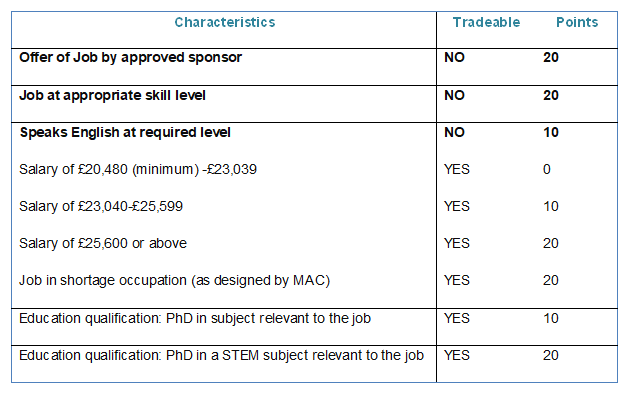Proud to be celebrating 170 years in business
The UK's New Points-Based Immigration System
As you may have seen or heard in the news, Home Secretary Priti Patel released further details on the new Points Based Immigration System which will come into effect on the 1st January 2021.
On 19 February 2020 the government released its Policy Statement setting out details of the new proposed points-based immigration system.
From 1 January 2021, free movement will end. This means that EU and non-EU citizens will be treated equally and will require a visa to be in the United Kingdom.
The main aim of the new system is to attract high skilled workers who can contribute to the UK’s economy. Irish citizens will be able to enter and live in the United Kingdom.
The new points-based immigration system will allow skilled workers from around the world to come to the United Kingdom through an employer who holds a sponsorship licence. The applicant (EU and non-EU-citizens) will need to demonstrate that they have the following (A minimum of 70 points is required);
- Applicant has a job offer by an approved sponsor at the required/appropriate skill level
- Applicant must Speak English
- Meets the salary threshold of £25,600
If the above requirements are met, then the applicant will be eligible to make an application.
However, if the applicant is not able to meet the salary threshold of £25,600 and has salary of no less than £20,480, they may still be able to come to the UK, if they can demonstrate that they have the following;
- A job offer in a specific shortage occupation
- Hold a PhD relevant to the job
This means that the applicant can “trade characteristics, such as their specific job offer and qualifications against a salary lower than the minimum salary or the going rate in their field” Policy Statement February 2020
Please see below a table which demonstrates this;

A TOTAL OF 70 POINTS IS REQUIRED TO BE ELIGIBLE TO APPLY; SOME CHARACTERISTICS ARE TRADEABLE.
The policy statement further sets out the following;
- Government will not be introducing low skilled visa route
- Salary threshold is reduced from £30,000 to £25,600 or the going rate, whichever is higher
- Removal of the Resident Labour Market Test
- The required skill level has been reduced from RQF level 6 (degree level) to RQF 3 (As or A level)
- Removed the cap
- The Global Talent Route will be opened to EU, EEA and Swiss citizens on the same basis as non-EU nationals. It will allow highly skilled scientists and researchers to come to the UK without a job offer if they are endorsed by a relevant/competent body.
- Tier 4 route will become available to EU, EEA and Swiss citizens later in the year
- Current Tier 5 and Tier 1 route will become available to EU Citizens.
- No Visa requirement for those EU, EEA and Swiss Citizens and non-visa nationals when visiting the UK for up to 6 months.
Priti Patel sets out further detail on the new immigration system;
- A Health and Care Visa ensuring the NHS still has access to the talent it requires.
- A new graduate route opening in the summer 2021, will enable international students to remain in the United Kingdom for two years once they have successfully completed their studies (Undergraduate Degree and Master’s Degree). Those who complete a PhD will be permitted to remain for three years.
EU Settlement Scheme:
For those EU, EEA and Swiss citizens already living in the United Kingdom by 31 December 2020, must apply under the EU Settlement Scheme. The deadline to make these applications is 30 June 2021. If you need advice on how to apply, please contact one of our team members who will be able to assist you.
If Employers are relying on personnel from EU member states, they must hold a sponsor licence to be able to sponsor personnel from the EU Member states. Please get in contact with one of our Immigration team members to seek further advice. Call us on 023 9266 0261 or email info@biscoes-law.co.uk
For further information or to speak to one of our experts, please get in touch
